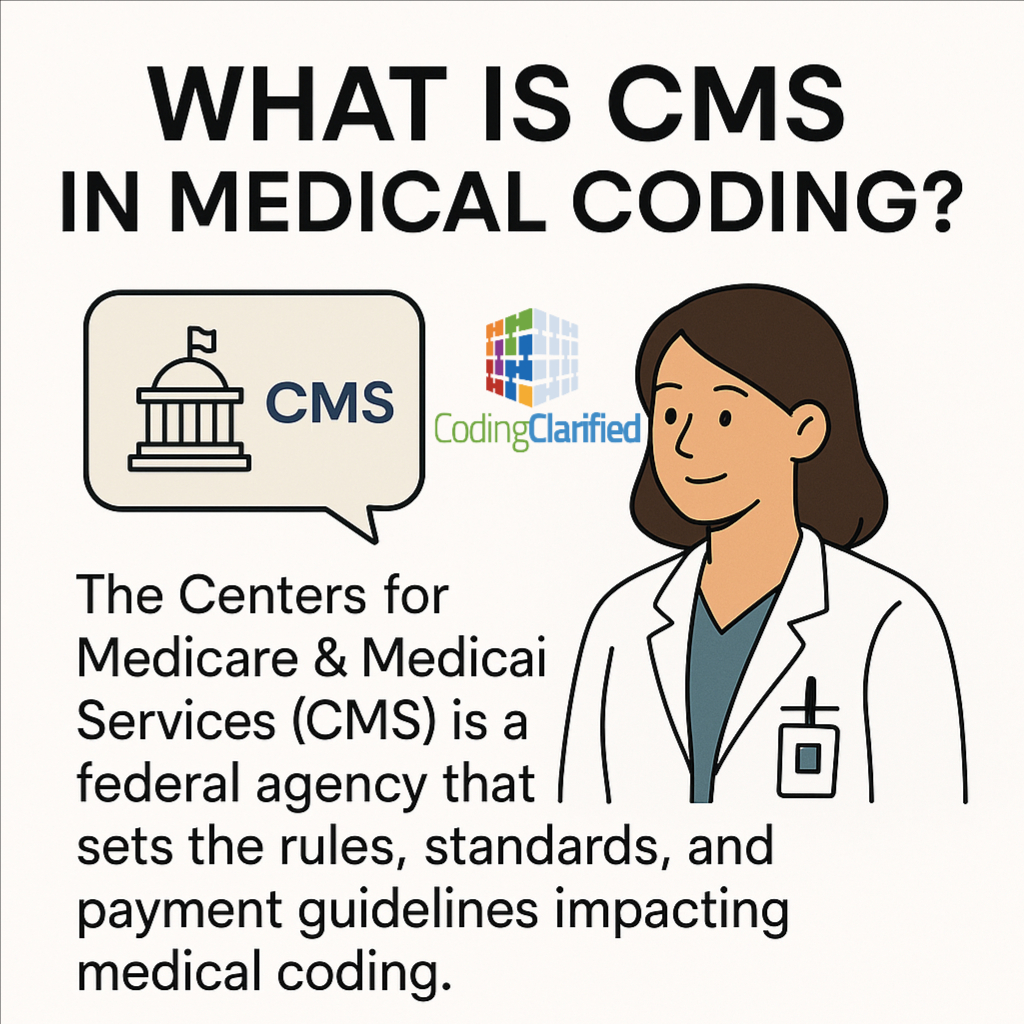What Is CMS in Medical Coding?
The Centers for Medicare & Medicaid Services (CMS) is a federal agency within the U.S. Department of Health and Human Services (HHS) that plays a critical role in healthcare administration and policy. In the context of medical coding, CMS sets the rules, standards, and payment guidelines that impact how healthcare providers document, code, and bill for services.
Role of CMS in Healthcare
CMS administers major healthcare programs in the United States, including:
- Medicare – Health coverage for people 65 and older and certain younger individuals with disabilities.
- Medicaid – Joint federal and state program for individuals with low income.
- Children’s Health Insurance Program (CHIP) – Coverage for children in families with incomes too high for Medicaid but too low for private insurance.
- Affordable Care Act (ACA) Marketplaces – Oversight of health insurance exchanges.
CMS and Medical Coding
Medical coders often interact with CMS guidelines in several ways:
Code Set Maintenance
CMS works with other organizations to maintain:
- ICD-10-CM (diagnosis codes) – Developed by the CDC but adopted by CMS for billing and reporting.
- HCPCS Level II – Codes for non-physician services, supplies, and equipment.
- CPT® – Maintained by the AMA but CMS incorporates it into Medicare payment policies.
Payment and Reimbursement Rules
CMS establishes:
- Medicare Physician Fee Schedule (MPFS) – Determines payment rates for services.
- Hospital Outpatient Prospective Payment System (OPPS) – Payment for outpatient hospital services.
- Inpatient Prospective Payment System (IPPS) – DRG-based payment for inpatient stays.
Coverage Determinations
CMS issues:
- National Coverage Determinations (NCDs) – Define whether Medicare will pay for a service nationally.
- Local Coverage Determinations (LCDs) – Region-specific coverage rules issued by Medicare Administrative Contractors (MACs).
Compliance and Auditing
CMS enforces coding accuracy through:
- Medical Necessity Rules – Services must be justified by the documented diagnosis.
- Recovery Audit Contractors (RACs) – Identify overpayments and underpayments.
- CERT Program – Reviews claims for proper documentation and coding.
Medical Coding Compliance https://codingclarified.com/medical-coding-compliance/
Why CMS Matters for Coders
For medical coders, understanding CMS rules is crucial because:
- Many commercial insurance plans follow Medicare guidelines.
- Accurate coding ensures proper reimbursement and compliance.
- CMS updates coding and payment policies annually—coders must stay current to avoid claim denials.
Tips for Staying Compliant with CMS Guidelines
- Check Medicare’s official website for updates on NCDs, LCDs, and fee schedules.
- Use authoritative resources like the Medicare Claims Processing Manual.
- Attend coding webinars or training focused on CMS policy changes.
- Document thoroughly to support medical necessity.
Bottom Line: CMS is not just a government agency—it is the backbone of U.S. medical coding and billing regulations. For coders, staying aligned with CMS guidelines ensures accuracy, compliance, and timely reimbursement.
CMS.gov Coding https://www.cms.gov/cms-guide-medical-technology-companies-and-other-interested-parties/coding
CMS.gov Medicare Learning Network https://www.cms.gov/training-education/medicare-learning-network/resources-training

